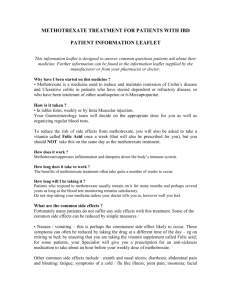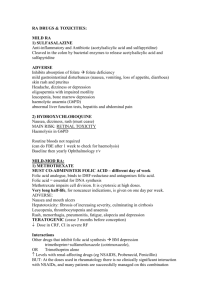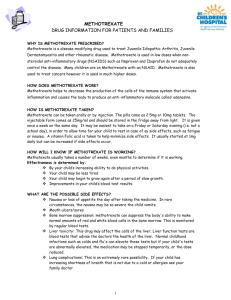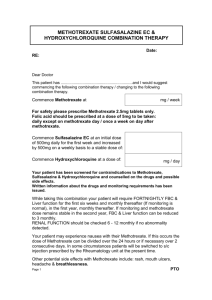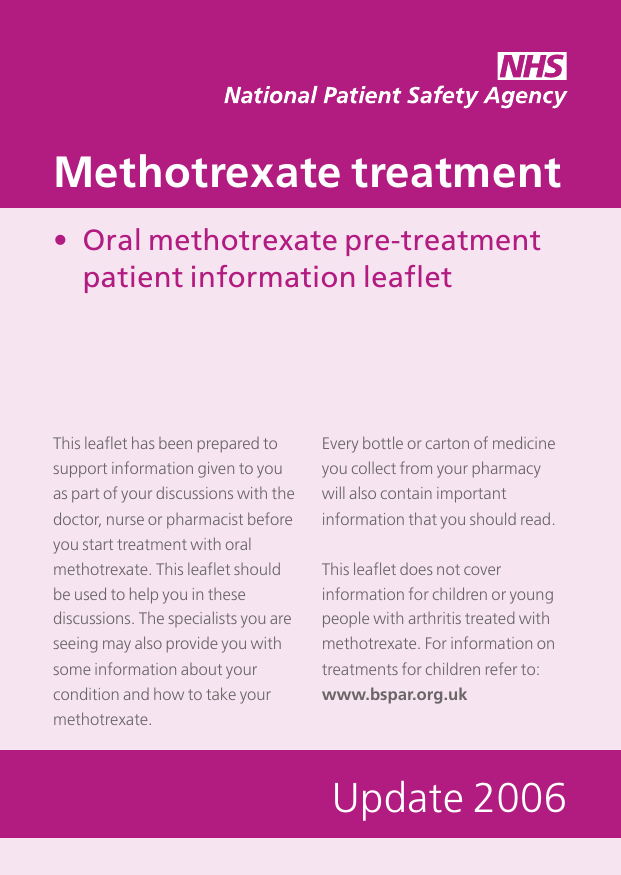
Methotrexate treatment
• Oral methotrexate pre-treatment
patient information leaflet
This leaflet has been prepared to
support information given to you
as part of your discussions with the
doctor, nurse or pharmacist before
you start treatment with oral
methotrexate. This leaflet should
be used to help you in these
discussions. The specialists you are
seeing may also provide you with
some information about your
condition and how to take your
methotrexate.
Every bottle or carton of medicine
you collect from your pharmacy
will also contain important
information that you should read.
This leaflet does not cover
information for children or young
people with arthritis treated with
methotrexate. For information on
treatments for children refer to:
www.bspar.org.uk
Update 2006
These guidelines have been written to
help you understand more about low
dose methotrexate. Sometimes your
treatment may differ from the
information provided in this leaflet.
The doctor or nurse will be able to
explain the reasons for this when they
advise you about your treatment.
Please keep this pre-treatment
leaflet as there is important
information that can act as a
reminder to you while you are
treated with methotrexate.
1
Low dose methotrexate
(25mg or less once a week)
What it is
Methotrexate was first used, in high doses, to treat cancer
but experience over thirty years has shown that
methotrexate at much lower doses is helpful in the
treatment of a number of joint, skin and bowel conditions.
Methotrexate is a well established effective treatment for
several different types of rheumatic diseases (for example,
rheumatoid arthritis, psoriatic arthritis, juvenile idiopathic
arthritis), severe psoriasis and bowel diseases (such as
Crohn's disease). It is also used in some other conditions
where the body's natural defence system is overactive.
Most people receiving methotrexate are greatly helped by it
and suffer few, if any, problems. It is however a powerful
medicine and must be treated with respect. This leaflet tells
you more about methotrexate and how the risks or
problems can be kept to a minimum.
The doctor or nurse treating your condition may give you
more information that explains about your particular
condition and your treatment. You should read all the
information you receive.
2
This leaflet only provides information for people being
treated with low dose methotrexate (25mg or less once a
week) for inflammatory conditions. It does not cover
treatment for cancer as the dose of methotrexate is much
higher and the treatment may vary considerably to the
information provided in this leaflet.
What methotrexate can do
Methotrexate acts by slowing the production of new cells by
the body's immune system. This helps to reduce the
inflammation that causes swelling and stiffness of joints,
thickened skin or damage to the bowel responsible for the
problems you experience with your condition. Methotrexate
reduces the permanent damage to joints caused by
continuing inflammation. It is not a painkiller.
Seeing the benefits
It may take up to 12 weeks after reaching the best dose for
your condition before you notice any benefits. It is important
that you continue to take your treatment. Although you may
not feel any benefit during this time, it is likely that the
methotrexate is working.
Methotrexate cannot cure your condition and you may need
to take it for several years to keep your symptoms controlled.
3
What happens before I start treatment?
Before you start treatment you will need some blood tests to
check your blood count, liver and kidneys. You may be asked
to have a chest x-ray and may also be asked to have
breathing tests to check your lungs. This information will
provide a record of how you are before you start treatment
and to check whether methotrexate is a suitable treatment
for you. A very small number of people will be unable to take
methotrexate because of lung or liver problems.
You will be asked about any other medicines, herbal,
complementary or alternative therapies you are taking as
these can interact with the methotrexate.
Effective contraception must be used by both men and
women receiving methotrexate. You must not take
methotrexate if you might be pregnant or are wishing to
start a family.
4
Your dose
A typical dose will range from 7.5mg to 25mg once a
week. Methotrexate is never taken every day. The dose will
vary for each person depending upon many factors such as
how active your disease is and how you respond to
the treatment.
Methotrexate is usually given as tablets but in some
circumstances can be given as a liquid or by injection. If you
are prescribed a liquid or injection, you should check how to
take these with your doctor, nurse or pharmacist.
Once a week
Your methotrexate should only be taken as a single
once a week dose on the same day each week.
What happens if I forget to take my tablets?
If you miss your methotrexate on your normal day, don’t
worry: you can take it the following day or two. For example,
if your normal day for taking your dose is Tuesday, you can
take it on Wednesday or Thursday. Do not take the dose if
you are three or more days late. A flare-up of the disease
during this time is unlikely. In both cases, take your next dose
on your usual day the following week.
5
Folic acid
A vitamin supplement called folic acid has been shown to
help your body cope with the methotrexate and also reduces
some of the side effects you may experience. Your doctor or
nurse will advise you when you should take these tablets.
See the section on possible side effects later in this leaflet.
It is important that you do not forget to take the folic acid
that you are prescribed.
How to take methotrexate
You should take the tablets by mouth, after food. Swallow
the tablets whole with a glass of water and do not crush or
chew them.
Safety in the home
You must keep methotrexate out of reach of children and
pets and handle the methotrexate as little as possible.
Tablets should be stored at room temperature.
If you have been prescribed a liquid or injection you
should check how to store these with your
pharmacist or nurse.
6
Check your prescription and tablets very
carefully every time you collect your medicines
Methotrexate tablets are made in two different strengths,
2.5mg and 10mg. The two strengths are different shapes
but the tablets are a very similar colour.
It is important that you take the correct strength and dose
of tablets. Always double-check your prescription carefully
in case you have been given a different strength of tablet
to usual.
Some hospitals and doctors have agreed to only use the
2.5mg strength to prevent any confusion; ask your doctor,
nurse or pharmacist whether this has been agreed in
your area.
It is important that you do not use your medicine if you
think you have the wrong strength. Check with your doctor,
nurse or pharmacist as soon as possible.
The doctor may wish to change the dose of methotrexate
you take. If your dose changes, the number of tablets you
need to take may change. It is important to show the
pharmacist your record book each time you collect your
medicines. You will still need to take the medicine only
once a week.
7
Why you need regular blood tests
When you first start treatment, blood tests will usually be
taken every week or at least once a fortnight. Once the dose
is stable, and the blood tests are satisfactory, the frequency
of your monitoring will be reduced. Regular blood tests will
help your doctor, nurse or pharmacist check how well your
body is coping with the methotrexate and will help to decide
whether you can continue on the treatment. The doctor may
increase or decrease the number of tablets you take
depending upon how well your treatment is controlling
your condition.
It will be your responsibility to ensure that you attend
regularly for your blood tests. It is important that you
do not miss your blood tests.
It is important that you do not take methotrexate unless you
are having regular blood tests. You should attend for your
review appointments to ensure that you are being carefully
monitored whilst you are receiving treatment.
In most cases your blood tests will tell the doctor how your
liver and bone marrow is coping with the methotrexate.
Occasionally further tests (for example liver biopsy) may be
needed to decide if you can stay on your medicine.
8
Who will be checking my blood test?
When you start treatment your doctor or nurse will explain
to you how the monitoring of your medication will be
managed. This may be managed by your hospital team or
shared between the hospital and your own general
practitioner team. Details of your blood test results will be
recorded in the separate monitoring booklet.
Monitoring booklets
The monitoring booklet is a valuable document which
should be kept carefully and taken with you every time you
see your general practitioner or attend hospital
appointments. Although in some parts of the country
computer systems allow some sharing of blood test results
between your general practitioner and hospital, there are
many parts of the country where your specialist or the
doctor treating you in an emergency will not have access to
the results of blood tests organised by your general
practitioner. It is therefore important that the results of your
blood tests are recorded and are kept up-to-date.
9
What problems must I look out for?
Most people on low dose methotrexate cope well with few,
if any, side effects. However, you should be aware of some of
the problems which can occur. It is always important to take
note of any new symptoms you experience after starting
treatment and discuss them with your doctor, nurse or
pharmacist.
There are also some side effects that must be dealt with
immediately (see ‘Side effects/problems that mean I need
to stop treatment immediately and get urgent medical
advice’).
General information about some side effects
If you experience one of the side effects mentioned below
do not take your next dose of methotrexate until you
have sought advice. You will be advised by your doctor or
nurse whether you will be able to restart methotrexate once
your problem has been investigated.
Do not take your next dose until you have spoken
to your doctor, nurse or pharmacist.
10
Feeling sick, upset stomach or diarrhoea
When you first start treatment you may feel unwell. This
normally settles but may persist. Speak to your doctor or
nurse as something can be done to help. These symptoms
can be helped in one of three ways:
• you may be advised to increase the amount of the
folic acid supplement you take;
• you may be advised to take another tablet that reduces the
feeling of sickness. These tablets are called anti-emetics;
• the doctor may wish to change your treatment to
methotrexate by injection once a week.
If you vomit within a few hours of taking methotrexate
do not take another dose. Make a note that you have
been unable to take your tablet and tell your doctor or nurse
if this happens again the following week.
Effects on your bone marrow or liver
Your blood tests will help to monitor these. Symptoms that
may show problems with the bone marrow or liver include
regularly catching infections, bruising or bleeding easily.
Your doctor or nurse monitoring your treatment will contact
you if there are any problems with your blood test results.
Occasionally changes in your blood may mean you have to
stop your methotrexate.
11
Mouth ulcers, sore throat or sore mouth
If you experience mouth ulcers, or a sore throat or mouth,
speak to your doctor, nurse or pharmacist. It may be
necessary for you to have a blood test to check how your
body is coping. In many cases, if your blood tests are normal,
you may be given some medication to treat these problems.
Infections
Methotrexate may reduce your ability to fight infections and
this can be a problem in some individuals who may be more
vulnerable to infections.
It is important to get prompt advice if you think you have an
infection (for example, a wound that fails to heal promptly,
pain or burning when passing water, or a chest infection).
Rashes – new rash or severe itching anywhere
on the body
If you get a new rash or severe itching seek advice from your
doctor, nurse or pharmacist.
Thinning of the hair
This can happen, although it is uncommon and, if it does
happen it is usually slight. Hair growth usually returns to
normal on stopping treatment. If you feel this becomes
more than a very slight hair loss you should discuss it with
your doctor.
12
Other problems may be experienced. Report these to
your doctor or nurse if the problems continue or if
they occur after every dose.
Side effects/problems that mean
I need to stop treatment immediately
and get urgent medical advice
Shortness of breath (breathlessness)
Methotrexate can very occasionally cause inflammation of
the lungs. The breathlessness caused by methotrexate can
come on gradually or over a few days. You may also have a
dry cough. If you feel breathless when resting and you don’t
have a heavy cold (runny nose and temperature) you should
stop your methotrexate and contact your doctor or
nurse. It is important that the doctor examines you as very
occasionally methotrexate can cause severe inflammation of
the lungs.
If the whites of your eyes become yellow or you
develop severe itching of the skin
Stop treatment and seek advice from your doctor or nurse,
as these are sometimes signs of liver problems.
13
Infections, including fever, chills or severe sore throats
It is important that you are careful about the risks of
infections and take sensible precautions to avoid them.
If you have any infection stop your methotrexate and get
prompt advice from your doctor or nurse.
New unexplained bleeding or bruising
This can sometimes mean that your blood cells are affected
by the methotrexate. Stop your methotrexate and seek
advice from your doctor or nurse.
Severe and continuing diarrhoea or vomiting
If you have severe diarrhoea and vomiting or are unable to
take fluids you may become dehydrated. Your kidneys may
then be unable to flush methotrexate from your blood. Stop
your methotrexate and seek advice from your doctor
or nurse.
If you think you are pregnant
Methotrexate may harm the unborn child and cause a
miscarriage. Men who are taking methotrexate should note
that your treatment may affect your sperm and therefore
you should ensure your partner should not become
pregnant whilst you are on the treatment. Women who
become pregnant whilst on the treatment should stop their
treatment immediately and speak to your doctor. For
women who have a partner taking methotrexate please see
their doctor for advice if you become pregnant.
14
Chickenpox and shingles
If you are taking methotrexate and have never had
chickenpox you may be at risk of severe infection from the
virus which causes chickenpox and shingles. If you come into
close contact with someone who has either of these
conditions, you should contact your doctor or nurse
promptly as you may need special treatment.
What happens if I need an operation (surgery)
- do I have to stop treatment?
Let your doctor or nurse know so they can advise you on
what to do about your methotrexate. Make sure you take
your monitoring booklet with you to all appointments or
pre-assessment clinics. If you are having an operation, in
most cases you will be advised to continue with your
treatment but it will help the doctors plan your care.
You should also make sure that your dentist knows you are
on methotrexate so they take this into account when they
are carrying out any dental treatment.
What happens if I am severely unwell
- do I have to stop treatment?
Sometimes if you become severely unwell or immediately
after an operation it may be necessary for you to stop your
methotrexate for a short while. Your hospital will make sure
that the medicines you are given are safe to be taken
together. This is because certain medications, for example
15
some antibiotics, interact with methotrexate and it is
important you don’t take them together especially if you
are dehydrated.
The team looking after you will also make sure that you
don’t get dehydrated and your kidneys are able to pass usual
amounts of urine so that your body can cope normally with
your medicines. Speak to your doctor or nurse for advice.
Other advice
Taking other medicines
It is important that your doctor knows about all the tablets
and remedies you take, including herbal and alternative
remedies.
You must not take co-trimoxazole (Septrin®) or
trimethoprim whilst taking methotrexate. These can react
with methotrexate and can be dangerous.
Always check with your doctor or pharmacist before taking
any other medicine. This includes checking medicines you
can buy over the counter such as aspirin, paracetamol or
ibruprofen, and medicines for coughs, colds and flu. Some
of these can interact with methotrexate. It is helpful to bring
a list of current medications with you when you see the
doctor, nurse or pharmacist.
16
If you have any additional problems that you are trying to
treat yourself, speak to your doctor, nurse or pharmacist
before purchasing any supplements or treatments to make
sure they can be taken with your methotrexate. It is possible
that the symptoms you are experiencing might be related to
your methotrexate.
What should I do if I accidentally take
too much methotrexate?
If you make a mistake and take too much methotrexate you
may need urgent hospital treatment. Keep the
bottles/cartons, make a note of how many tablets you think
you have taken and contact your doctor or local accident
and emergency department immediately. If the error is not
considered serious, you may just need to have your blood
checked and miss your next dose. If it is serious, however,
you may need urgent treatment with a drug (calcium
leucovorin or calcium folinate) which can reduce the effects
of methotrexate.
Alcohol
Methotrexate and alcohol may both cause liver damage. The
risk of liver damage from methotrexate appears to be
greater in psoriasis than with individuals who have
rheumatoid arthritis. The risk is increased by alcohol. If you
are taking methotrexate you should ensure that your alcohol
intake is well within the maximum limits (2-3 units per day
for women and 3-4 units per day for men).
17
If you have psoriasis, it may be recommended that you avoid
alcohol altogether. You may also have an additional blood
test (PIIINP) to monitor your liver although sometimes a
further test is needed (a needle biopsy of the liver). Your
doctor or nurse can provide further individual advice on this.
Food
Methotrexate may reduce your ability to fight infection.
There are some reports of bacteria (germs) found in food
that may cause a problem to those with a reduced ability to
fight infections. These risks have not been directly linked to
taking low dose methotrexate. However, the few cases
reported are usually linked to those taking a number of
medicines that dampen down immunity. It would be
sensible to be cautious about unpasteurised milk or soft
cheese and be aware of food preparation and normal
hygiene conditions in the handling of food, particularly if you
are also taking steroids or one of the newer biologic therapies
(adalimumab, anakinra, etanercept, and infliximab).
Having a baby
Methotrexate can reduce fertility in men and women. It may
also damage the unborn child.
18
Women should not take methotrexate if they are
breastfeeding, pregnant or wish to become pregnant.
If you think you might be pregnant do not take
methotrexate. Men should not attempt to father a baby
while taking methotrexate.
It is recommended that women wait at least three months
after stopping treatment, before trying for a baby. It is also
recommended that men wait at least three months after
stopping treatment before trying to father a child, as sperm
can be affected. You should talk to your doctor or nurse
about effective contraception.
Vaccinations
It is important that any doctor or nurse you see is aware that
you are on methotrexate and that you should not receive any
live vaccines.
This is because live vaccines may not work well while you are
on methotrexate.
Live vaccines include yellow fever, MMR and rubella
(German Measles). There are often alternatives to live
vaccines that can be given. You should speak to your doctor
or nurse for advice.
Close relatives and family members may have live vaccines as
normal. This will not be a risk to you.
19
Flu vaccination and Pneumovax® are safe as they are not
live vaccines.
Speak to your doctor or nurse for advice.
Other information
If your treatment ends and you have some methotrexate left
over, return any remaining medicine to your pharmacist. Do
not flush them down the toilet or throw them away.
Use the separate monitoring booklet to record your blood
test results.
Contact information
NHS Direct
www.nhsdirect.nhs.uk
Tel: 0845 4647
NHS Direct Wales
www.nhsdirect.wales.nhs.uk
Tel: 0845 4647
You must tell NHS Direct if you are taking oral methotrexate
if seeking their help. Specific patient information leaflets are
produced that can give you information about your
condition and treatment with methotrexate.
20
Patient and professionals organisations
Arthritis Care
www.arthritiscare.org.uk
Tel: 0808 800 4050
Arthritis Research Campaign
www.arc.org.uk
Tel: 0870 850 5000
National Rheumatoid
Arthritis Society
www.rheumatoid.org.uk
Tel: 0845 458 3969
National Association
for Colitis and Crohn's disease
www.nacc.org.uk
Tel: 0845 130 2233
Psoriasis Association
Tel: 0845 676 0076
www.psoriasis-association.org.uk
Psoriasis Arthropathy Alliance
www.paalliance.org
Tel 0870 770 3212
21
British Society for Rheumatology
www.rheumatology.org.uk
Tel: 0207 842 0900
British Association of Dermatologists
www.bad.org.uk/public
National Library for Health on skin conditions
www.library.nhs.uk/skin
British Society for Paediatric and Adolescent Rheumatology
www.bspar.org.uk
22
Important notice
This patient information leaflet has been compiled, after
consideration of the information available, by the National
Patient Safety Agency as at June 2006. It is not intended to
be exhaustive and should not be used as a substitute for
consulting your clinician on any particular issue. The
National Patient Safety Agency makes no representations,
warranties or guarantees as to the accuracy, completeness
or adequacy of any of the content of this patient information
leaflet and cannot be held responsible for any liability, loss or
damage whatsoever which may arise from the use of, or
reliance upon, this patient information leaflet, except as may
otherwise be required by law.
The National Patient Safety Agency
4 - 8 Maple Street
London
W1T 5HD
T 020 7927 9500
F 020 7927 9501
0267SEP05
© National Patient Safety Agency 2006. Copyright and other intellectual
property rights in this material belong to the NPSA and all rights are
reserved. The NPSA authorises healthcare organisations to reproduce this
material for educational and non-commercial use.
www.npsa.nhs.uk

